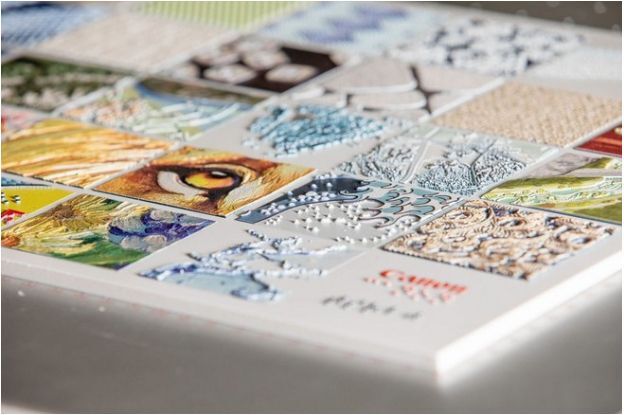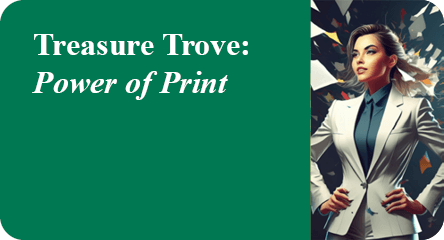
In today's digital age, where screens dominate our attention, the power of touch is often overlooked. However, tactile marketing – the use of texture and finish in print materials – can create a memorable and impactful experience for your audience. Let's explore how texture and finish can elevate your marketing efforts and leave a lasting impression.
The Psychology of Touch
Before diving into specific techniques, it's important to understand why tactile marketing is so effective:
- Sensory Engagement
Touch engages an additional sense beyond sight, creating a more immersive experience. - Emotional Connection
Tactile experiences can evoke emotions and memories, forging a stronger connection with your brand. - Perceived Value
Unique textures and finishes often correlate with higher perceived quality and value. - Memorability
Unusual textures are more likely to be remembered than standard smooth surfaces. - Increased Interaction Time
People tend to spend more time interacting with materials that have interesting tactile qualities.
Texture Techniques to Consider
- Embossing and Debossing
These techniques create raised or recessed designs, adding depth and interest to your materials. - Soft Touch Coating
This velvety finish adds a luxurious feel to paper, making it irresistible to touch. - Textured Papers
From linen to felt finishes, textured papers provide a built-in tactile experience. - Raised UV Coating
This technique creates a glossy, raised surface that can be applied selectively to emphasize certain elements. - Laser Cutting
Intricate cuts can create delicate textures and patterns, adding visual and tactile interest. - Foil Stamping
While primarily visual, foil stamping can add a subtle texture that invites touch. - Letterpress
This traditional printing method creates a slight indentation in the paper, adding texture and a handcrafted feel.
Finishes That Make an Impact
- Matte Finish
A smooth, non-glossy finish that can convey sophistication and understated elegance. - Gloss Finish
High shine that makes colors pop and adds a sleek, modern feel. - Satin Finish
A middle ground between matte and gloss, offering a subtle sheen. - Spot UV Coating
A glossy coating applied to specific areas, creating contrast with uncoated portions. - Metallic Finishes
These can add a touch of luxury and catch the light in interesting ways. - Soft Touch Laminate
Similar to soft touch coating, this laminate adds a velvety feel to the entire surface. - Gritty Texture
A sandpaper-like finish that can be used for specific design elements or entire surfaces.
Choosing the Right Texture and Finish
When selecting textures and finishes, consider:
- Brand Identity
Choose options that align with your brand's personality and values. - Target Audience
Consider what will appeal to your specific demographic. - Purpose of the Material
The function of your print piece should inform its tactile qualities. - Budget
While some techniques are more costly, there are options for every budget. - Environmental Impact
Consider eco-friendly options if sustainability is important to your brand.
Creative Applications of Texture and Finish
- Business Cards
Use embossing or textured paper to make your cards memorable. - Brochures
Incorporate different paper stocks or finishes within the same brochure for added interest. - Packaging
Leverage texture to create a luxurious unboxing experience. - Direct Mail
Stand out in the mailbox with unique textures that beg to be opened. - Invitations
Add elegance with letterpress or foil stamping. - Annual Reports
Use finishes strategically to highlight key information and add perceived value. - Product Catalogs
Incorporate textures that complement or mimic your products.
Combining Textures and Finishes
Don't be afraid to mix and match:
- Contrasting Textures
Combine smooth and rough textures for visual and tactile interest. - Layered Finishes
Use techniques like spot UV over matte lamination for subtle contrast. - Texture Gradients
Transition from one texture to another across a single piece. - Texture as Information
Use different textures to convey information hierarchy or guide the reader's attention.
Measuring the Impact of Tactile Marketing
To gauge the effectiveness of your tactile marketing efforts:
- Engagement Metrics
Track how long people interact with your materials. - Response Rates
Compare response rates between standard and tactile marketing pieces. - Brand Recall
Conduct surveys to measure brand recall after tactile marketing campaigns. - Perceived Value
Gather feedback on how tactile elements affect perceptions of your brand or product. - Social Media Mentions
Monitor social media for mentions of your unique print materials.
Best Practices for Tactile Marketing
- Don't Overdo It
Use texture and finish strategically – too much can be overwhelming. - Consider Practicality
Ensure that added textures don't interfere with the functionality of your materials. - Test Before Committing
Always request samples before large print runs to ensure the desired effect. - Integrate with Design
Textures and finishes should complement your overall design, not compete with it. - Think About the Full Experience
Consider how texture will interact with other elements like color and typography.
Conclusion
Tactile print materials offer a unique opportunity to stand out and create memorable brand experiences. Sometimes it's not just about what you say, but how it feels. By appealing to the sense of touch, you can create a multi-sensory experience that resonates with your audience long after they've put your materials down. Thoughtfully incorporating texture and finish into your print materials engages more senses, evokes emotions, and leaves a lasting impression on your audience.
At Minuteman Press Uptown, we're passionate about helping businesses leverage the power of tactile marketing. Our team of experts can guide you through the myriad of texture and finish options, helping you choose the perfect combination to elevate your brand and captivate your audience.
Ready to explore how texture and finish can transform your print materials? Contact Minuteman Press Uptown today at mpuptown.com. Let's work together to create print pieces that don't just communicate your message, but invite your audience to experience your brand in a whole new way.

